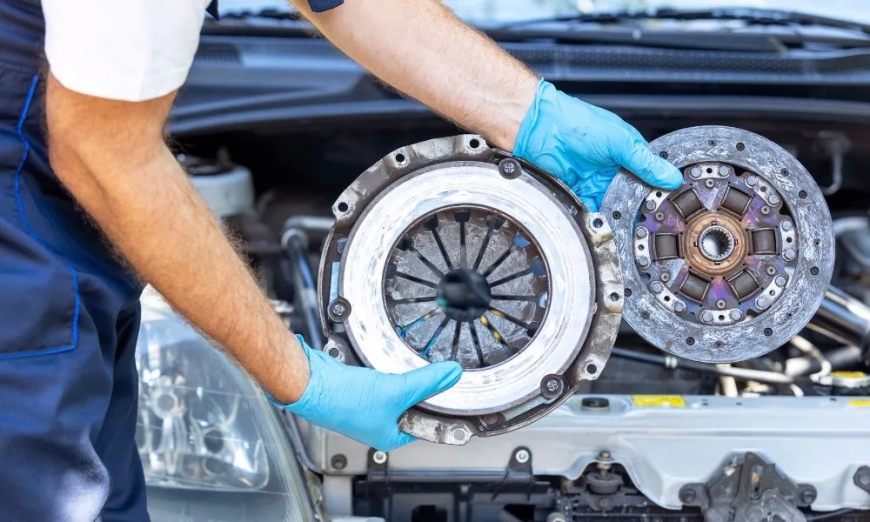Choosing the Right Mechanic for Your Clutch Repairs: Key Considerations
This guide will help you navigate the process of selecting the best mechanic for your clutch repairs, ensuring your vehicle remains in top condition.

When it comes to vehicle maintenance, few tasks are as critical as clutch repairs. The clutch is a vital component in manual transmission vehicles, ensuring that power from the engine is transmitted smoothly to the wheels. When this system fails or begins to show signs of wear, finding a reliable and skilled mechanic is essential. However, not all mechanics are created equal, and choosing the right one can significantly impact the quality and cost of your clutch repairs. This guide will help you navigate the process of selecting the best mechanic for your clutch repairs, ensuring your vehicle remains in top condition.
Why Choosing the Right Mechanic Matters
The clutch system is complex, involving various components like the clutch disc, pressure plate, release bearing, and sometimes the flywheel. A mistake during repairs can lead to further damage, increased costs, and even safety issues. Therefore, it's crucial to select a mechanic who is not only skilled but also trustworthy and experienced in clutch repairs.
Key Considerations When Choosing a Mechanic
Here are some key factors to consider when selecting a mechanic for your clutch repairs:
1. Experience and Expertise
One of the most critical factors is the mechanic’s experience with clutch repairs. Not all mechanics specialize in this area, so it's essential to find one who has extensive experience working on clutches, especially for your specific make and model. Ask about their experience and whether they have dealt with similar issues before. A mechanic who specializes in transmissions or drivetrains is often a good choice.
Questions to Ask:
-
How many years of experience do you have with clutch repairs?
-
Have you worked on clutches for my vehicle’s make and model before?
-
Can you provide references from past customers who had similar repairs?
2. Reputation and Reviews
A mechanic's reputation is a strong indicator of their reliability and the quality of their work. Check online reviews on platforms like Google, Yelp, or specialized automotive forums. Pay attention to comments about the mechanic’s honesty, quality of work, and customer service. Word of mouth is also powerful; ask friends, family, or coworkers if they have recommendations for a trustworthy mechanic.
Where to Look:
-
Online review sites like Google Reviews, Yelp, and Trustpilot
-
Automotive forums or social media groups dedicated to your vehicle’s brand
-
Recommendations from friends, family, or colleagues
3. Certifications and Training
Certifications can give you peace of mind that the mechanic has undergone proper training and adheres to industry standards. Look for certifications from reputable organizations like the National Institute for Automotive Service Excellence (ASE). Mechanics who are certified are more likely to be knowledgeable about the latest technologies and repair techniques.
Certifications to Look For:
-
ASE (Automotive Service Excellence) certification
-
Manufacturer-specific certifications, especially if you drive a luxury or high-performance vehicle
-
Training in modern clutch systems and transmission repairs
4. Warranty on Repairs
A reliable mechanic should stand by their work. Ask if the mechanic offers a warranty on the clutch repairs, which can cover both parts and labor. A good warranty indicates that the mechanic is confident in the quality of their work and is committed to customer satisfaction.
What to Expect:
-
Warranties typically range from 12 months/12,000 miles to 24 months/24,000 miles
-
Some shops may offer extended warranties for an additional fee
-
Always get the warranty details in writing before agreeing to the repair
5. Pricing and Transparency
Clutch repairs can be expensive, so it’s important to find a mechanic who is upfront about costs. Get a detailed estimate that breaks down the cost of parts, labor, and any additional fees. Beware of mechanics who are vague about pricing or reluctant to provide a written estimate. While you shouldn’t choose a mechanic based solely on the lowest price, transparency in pricing is a sign of a trustworthy professional.
What to Ask For:
-
A detailed written estimate before the work begins
-
An explanation of each charge, including parts, labor, and any additional fees
-
Information on whether the parts used will be OEM (Original Equipment Manufacturer) or aftermarket
6. Turnaround Time
The time it takes to complete clutch repairs can vary depending on the complexity of the job and the mechanic’s workload. Ask about the expected turnaround time and whether the mechanic can meet your schedule. While it’s important to get your vehicle back as soon as possible, don’t sacrifice quality for speed. A rushed repair job can lead to further issues down the line.
Questions to Ask:
-
How long will the repair take?
-
Do you have the necessary parts in stock, or will they need to be ordered?
-
What happens if additional issues are discovered during the repair?
7. Communication and Customer Service
Good communication is key to a positive repair experience. Choose a mechanic who is willing to explain the problem, discuss the repair options, and keep you updated throughout the process. Mechanics who prioritize customer service will ensure you feel informed and comfortable with the work being done on your vehicle.
Signs of Good Communication:
-
The mechanic takes the time to explain the issue and the repair process
-
You receive regular updates on the progress of the repair
-
The mechanic is willing to answer any questions you have
8. Facility Cleanliness and Organization
While it may seem minor, the cleanliness and organization of a repair shop can be indicative of the quality of work. A well-maintained and organized facility suggests that the mechanic pays attention to detail and takes pride in their work. It also indicates that the shop is likely to take good care of your vehicle.
What to Look For:
-
A clean, well-organized shop with modern equipment
-
Proper storage of tools and parts
-
A professional and welcoming environment
Final Thoughts
Choosing the right mechanic for your clutch repairs is crucial to ensuring that the job is done correctly, efficiently, and at a fair price. By considering factors such as experience, reputation, certifications, warranties, and communication, you can make an informed decision that will keep your vehicle in optimal condition.
Remember, clutch repairs are an investment in your vehicle’s health and safety. Don’t rush the process of choosing a mechanic. Take the time to do your research, ask the right questions, and select a professional who meets your needs and expectations. With the right mechanic, you can drive with confidence, knowing that your vehicle is in good hands.
What's Your Reaction?


















![[???????????????????????????? ???????????????? ????????????????????????] Can I Change My Name On Expedia Airlines](https://news.bangboxonline.com/uploads/images/202501/image_430x256_67915cce6df9e.jpg)




